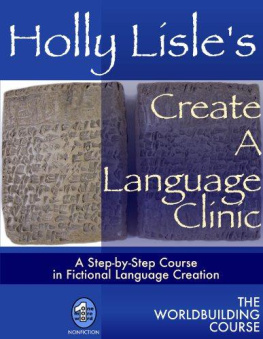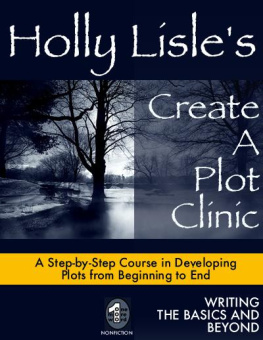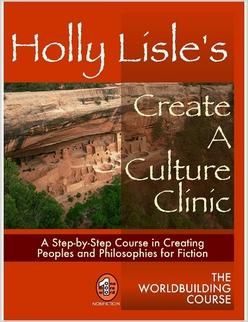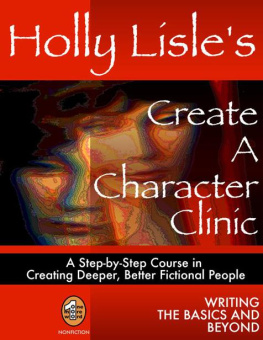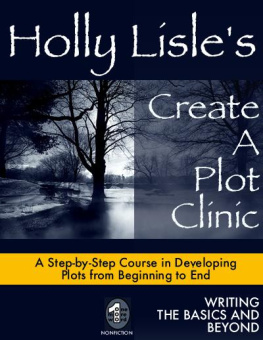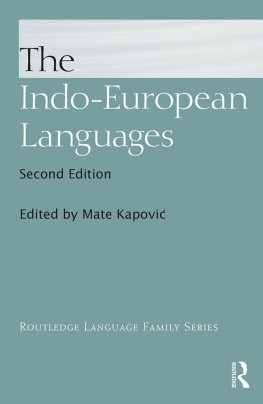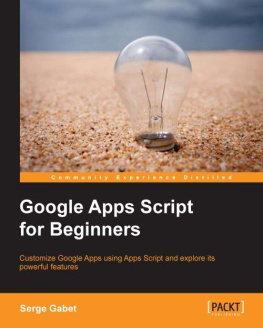

TABLE OF CONTENTS |
 |


Author's Note
This book started out as the first chapter in what was to have been Holly Lisle's Worldbuilding Clinic. When it passed fifty pages, I knew the manuscript was hopelessly beyond being disguised as one chapter. When it passed a hundred, it reached full workbook status and became, instead, the first of three (planned) books in THE WORLDBUILDING COURSE. The other two that I have planned are Holly Lisle's Create A Culture Clinic, and Holly Lisle's Create A World Clinic, to be written in that order. I think odds are good that I'll be able to keep the next two books within bounds. But after so many years of doing this, I've discovered that books will surprise you.
Thank you for buying Create A Language Clinic. I hope you discover that you enjoy the language-creation process as much as I do.
Holly Lisle 6/14/06
P.S. If you'd like to let me know how your language building went, you can reach me at ) so others can get the same information.
If you'd like to post a recommendation of or review for this book a the webstore, you can do so here:
http://shop.hollylisle.com/recommend/quotes.php?new=1
Chapter One
Why Create Languages?
There are a few basic reasons I can come up with, including the one that has led me to create several dozen so far.
You write fantasy or science fiction or another form of fiction that would benefit from characters speaking or writing in languages that are unique to your worlds.
You are a role-playing game designer, game master (GM), or worldbuilder, and you need workable languages within the game.
You are a conlanger, you love languages, and you'd like to see how someone else organizes the process of creating them.
You want to do something really different, but you don't want it to involve the pain of tattoos or piercing, and talking with your friends in your own real language would be really, really different.
You're a Secret Master of the Universe, and your plan to take over the world involves getting everyone on board with one languageand you want it to be one that only includes concepts of which you approve.
It's ridiculously fun. Yes, but ....
Why a language? How could a made-up language possibly add to a work of fiction, or a game universe, or your personal amusement?
Consider the following:
A Language Is the Soul of Its People
We breathe language, we live language, and we dream language. Language is the way the past communicates with the present, the way the present communicates with the future, the way we form our goals and aspirations, transmit them to others, and make them come true. Shared language allows us to gather together to share our dreams and our strength; languages that we do not know drive us apart.
Language is what we have instead of telepathy, and it's a good replacement. With someone who shares our language, we can express emotion, make plans, tell stories about things that once happened and things that never will, invent new ideas, create worlds. Language is magic.
Common language is the first requirement for a people to be a people. Without shared language, there can be no comprehension, no understanding, no shared ground between two people, or between two groups of people. Ideas break in translation, concepts vanish where there are no equivalent words. The other requirements that make up a peoplea shared philosophy and shared goals, die on the altar of the common tongue.
If you cannot communicate with each other, you cannot know each other.
Languages Shape Thought
What does "snow" mean to you? Cold white stuff on the ground, right?
What does it mean to an Eskimo, who lives in a world where snow is both ally and enemy, and who has multiple words for the same frozen white stuff, each specifying a subtle difference: snow that is safe to walk on, snow that is treacherous and will collapse, snow that packs well, snow that can be cut into blocks, snow that is coming and that will kill those who wander out into it.
The concept of "snow" is something entirely different to someone whose life depends on understanding and identifying its subtleties. To understand snow as an Eskimo understands snow, you have to live as an Eskimo lives. And you have to learn the words.
Understanding that languages shape thought is a form of power. Those who control words and the meanings of words control the thought of the people. If this were not the case, books would never be banned from schools or states or nations, the Chinese government would not be making deals with Internet search engines to censor out words like "freedom" and "democracy" from the Chinese people, and the PC movement would not be fighting words like "fireman" and "waitress" and "handicapped" and "fat." And politicians and political weenies would not constantly be trying to align enemy political camps with the devil as they see him. Her. Whatever.
Words matter. The language you first learn molds your thoughts. You cannot comprehend science as anything but magic if you do not have (or invent) a scientific vocabulary; you cannot discuss philosophy with only concrete nouns; and you cannot create a genuinely foreign culture using only the concepts embodied in the English language.
To some folks, "freedom" really does mean nothingthe concept doesn't exist in their language, or the experiences in their lives. If you're going to understand (or create) those people, you have to learn to see the world through the eyes of their language.
Languages Create Conflict
In the real world, language-induced conflict is not a good thing. (For examples of language-induced conflict, study English-speaking Canadians and French Canadians, Albanians in Serbia, and Latinos in the US.) Fights get ugly, they divide people, and they prevent communication.
But can't we all just get along?
No. Because (circle back to point A) language is the soul of a people, and you can't be a people if you don't speak the same language, because different languages embody different concepts and preclude non-speakers from ever truly belonging.
Sometimes you can't even be a people if you do speak the same language but if you don't, forget it. You're dead in the water before you begin.
As crappy as this is in real life, it's great in fiction.
You can have two nations sitting side by side, loathing each other and believing horrible things about each other because the people cannot understand what the translators say, and so are at the mercy of those who speak both languages. If they could just communicate with each other directly, they would discover that they have much more in common than they have been led to believe. This story could feature either the evil manipulators who profit from their ignorance, or the hero who finds a way to give them a common tongue. Or both.

